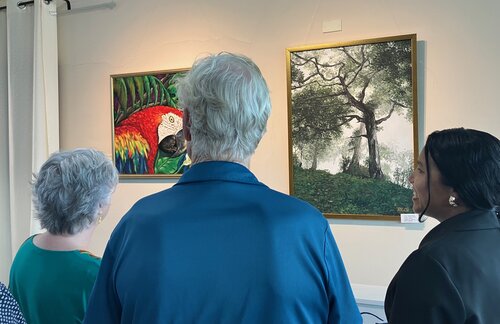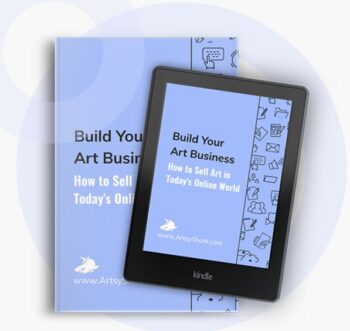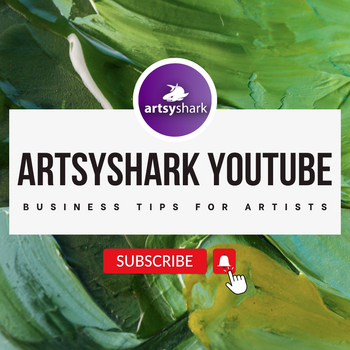by Carolyn Edlund
Artists can develop meaningful connections with potential collectors through authentic conversations.

Art doesn’t sell itself. And because of that, you as the artist should be comfortable discussing your work with potential collectors. But where to start? It’s not easy to become a masterful speaker, especially when it comes to self-promotion.
Fortunately, it’s not necessary to transform yourself into a salesperson to share vital information that will help convert prospects into new customers. It just involves being yourself and expressing your love for what inspires you to create art. Consider the opportunities you have when speaking face-to-face with others viewing your art (which is the best way to sell, by the way.)
You might be attending an opening where your art is being exhibited at a gallery or other venue. You could be hosting an open studio event, participating in an art fair, or even chatting at a casual social gathering. The key is to engage authentically about your creative practice, what inspires you, the techniques you use, or what makes your art unusual or special. Your authentic energy and passion as an artist makes all the difference to the listener.
The good news is that artists already have a significant advantage in these conversations. There’s something genuinely captivating about meeting a working artist that draws people in. Most folks harbor a secret fascination with the creative process. They might feel a mix of admiration and curiosity about how artists bring their visions to life, or even secretly wish they could be an artist themselves. In most cases, they’re already interested before you even start talking.
When you meet someone who shows genuine interest in your work, try asking them directly: “Are you a collector?” This simple question is actually a wonderful compliment. Many people don’t immediately think of themselves as art collectors. But the truth is that anyone can start collecting simply by purchasing one piece they truly love. Once you reframe it this way, you’ll often discover that the person you’re speaking with already owns artwork or has been thinking about starting.
Art collectors, whether seasoned or just beginning, share a deep emotional connection with their pieces. There are countless stories of people describing how they’d rescue their artwork first in an emergency. This sentiment reveals just how meaningful these objects become in their lives. When you tap into this level of emotion, during a conversation, you connect with what genuinely matters to them. This kind of personal connection is a steppingstone for many customers who are considering their next acquisition.
This naturally opens the door to discussing what specifically attracts them to your work. Some people are drawn to bold imagery. They may love your unique color choices, while others want to understand the technical aspects of your process. The key is recognizing that everyone connects with art differently. And since you are the expert on your own art, you are the best person to discuss your work from multiple angles.
Process-oriented conversations often captivate people in unexpected ways. When someone examines a complex piece and wonders aloud how it’s even possible to create something like that, you have a perfect opportunity to share your expertise. Be ready with engaging stories about your studio practice. How many kiln firings were required for that ceramic piece? What tools did you use to achieve those intricate wood carvings? What unconventional materials went into that mixed media work?
Sharing your behind-the-scenes insights does more than satisfy curiosity. It actually adds perceived value to your work while making you more memorable as an artist. When people understand the skill, time, and thoughtfulness that goes into your creations, they develop a deeper appreciation for what you do.
Your personal story and creative inspiration can provide a rich conversational thread. However, deep conversations involve a genuine exchange of ideas. After sharing what drives your work, ask them which piece resonates most strongly with them and why. Their response often reveals whether they’re connecting with your art on an emotional level, perhaps because it triggers a personal memory or speaks to something meaningful in their life.
Sometimes you’ll discover that a piece holds special significance as a potential heirloom or has an interesting backstory worth sharing. Collectors love these narratives because they become part of the artwork’s legacy. When they display your piece in their home, they often share these stories with visitors. This extends the connection far beyond the initial purchase, and can lead to becoming a repeat collector of your art.
Authentic exchanges create the foundation for real relationships. When the conversation flows naturally and you sense genuine interest, it becomes perfectly appropriate to ask, “Would you be interested in owning this piece?” Even if they’re not ready to purchase immediately, this is your cue to exchange contact information and maintain the connection.
Creating opportunities to meet potential collectors can require significant effort and planning. Exhibitions, gallery shows, studio tours, and art fairs represent substantial investments of time and energy. Make the most of these occasions by following up after the event in a thoughtful and genuine way. Building collector relationships almost always requires multiple touchpoints. The initial conversation you have with another person who admires your work is just the beginning. But it could become a lasting connection with someone who truly values what you do and becomes your next collector.




Speak Your Mind